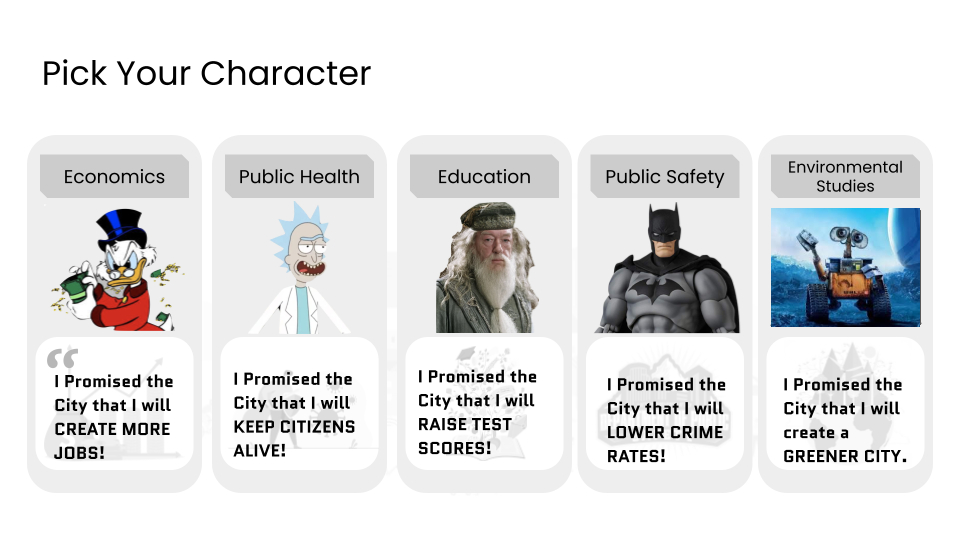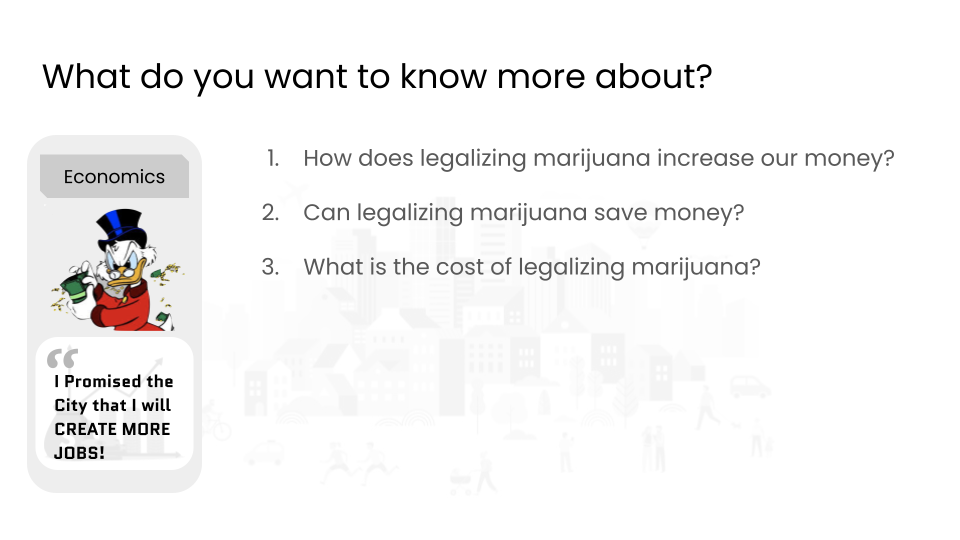Hello and welcome to CivRep’s week four blog!
We began week four by squeezing in a playtest right before quarters.
Playtest
Goals & Expectation
Our goal in this playtest was to observe how adding backgrounds and specializations to the characters in the game would affect the experience. Guests were allowed to choose their character at the beginning of the game, and each character was set to be an expert in a given field, such as economics. Based on the character they chose, guests would receive information related to their area of expertise on the public policy currently being discussed throughout the game.
Our expectation was that introducing these backgrounds and specializations would help stimulate more meaningful conversations, by providing all guests with relevant information that would allow them to offer different perspectives and approaches to each issue being discussed.
How the Playtest Worked
In our playtest, our five guests roleplayed as representatives in a city council, with each representative having a different background/specialization. The guests were presented with two scenarios, where they had to vote yes or no on a public policy proposal. Depending on the choices they make, their city’s stats (Public confidence, safety, health, money, and environment) would shift to reflect their decision.
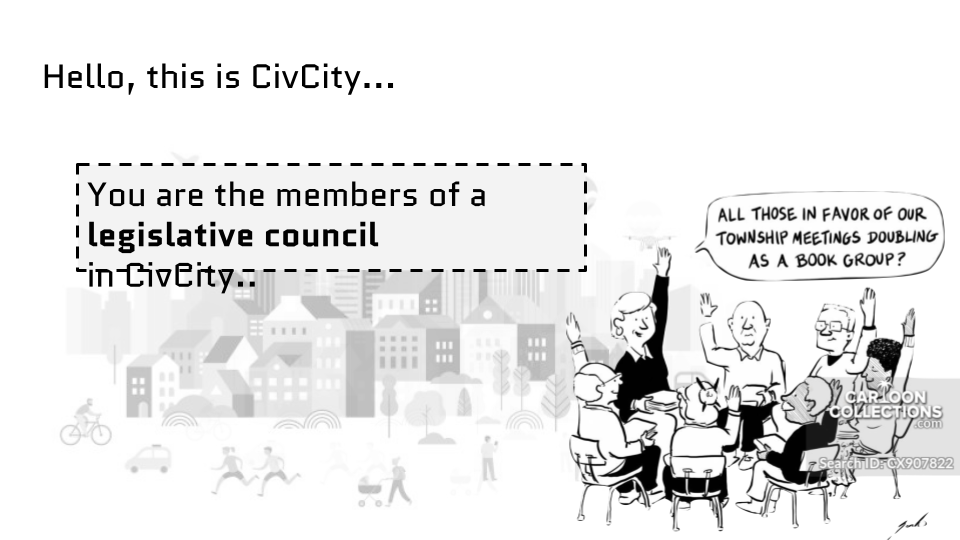
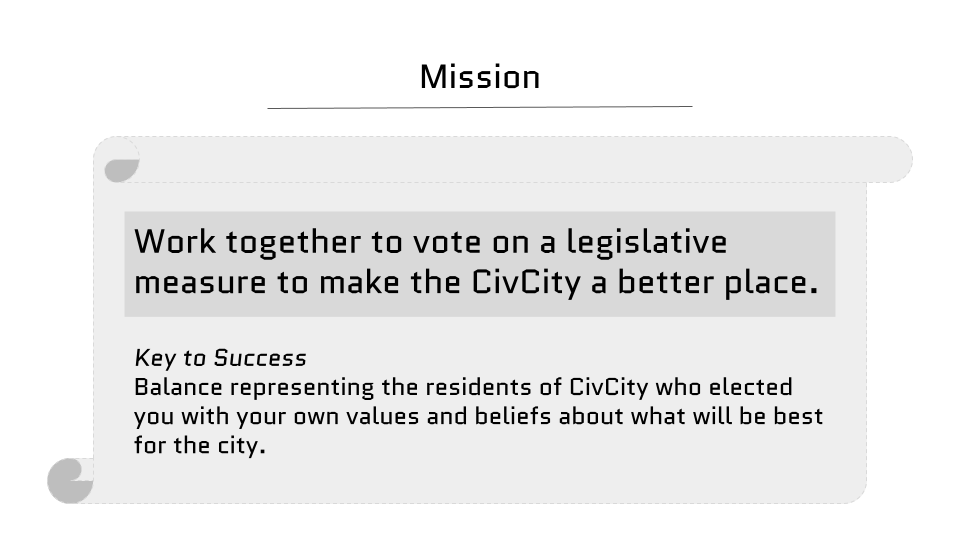
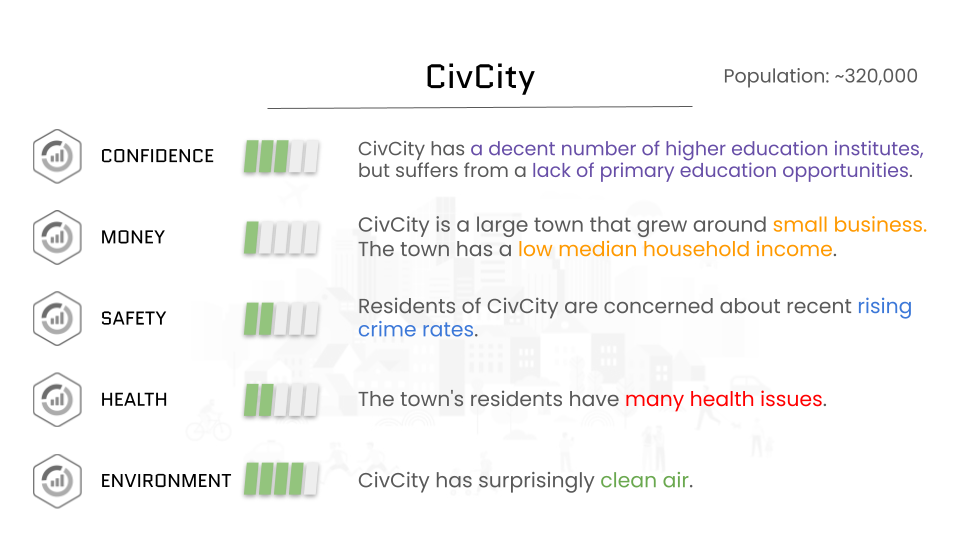
City Metrics & Description
In the first scenario, the guests were given two and a half minutes to discuss the policy proposal. They were given only basic information on the topic, and were allowed to converse freely during the given time frame.
For the second scenario, the guests were given five minutes to discuss the policy proposal. We gave each guest a prepared list of questions related to their representative’s background and specialization. After one minute of discussion, the guests were allowed to ask one of the listed questions. After another two minutes of discussion, the guests could choose to ask one more question from the list.

What we learned
Guests overall found the new backgrounds and information helpful to making the conversations more productive and engaging. Even when the guests themselves knew next to nothing about the topic being discussed, the information allowed them to participate and feel relevant during the game. Our playtesters also shared with us some of the problems they faced as well. One guest found that their background was not exactly relevant to the topic being discussed, and felt unable to participate fully in that scenario. Others felt that although they had some information they wanted to share, they could not find the proper timing to enter the conversation at times. Others felt that they were not exactly connected to the role they were given, and found it hard to embrace the roleplaying experience at times.
Quarters
During the quarters walkarounds and sitdowns, we received a bounty of helpful feedback and comments. Here we will discuss two major questions that most frequently popped up in our discussions with faculty and staff:
How do we connect in-game learning to real life engagement? How does gameplay facilitate our transformational goal of creating a civically engaged citizen?
One of the major questions that came up repeatedly was, how does the gameplay actually connect to real life civic engagement? In our current design, the guests can only make changes happen by voting as a city council representative. However, many of the people playing this game are probably not interested in becoming a public official. For us to actually encourage real life civic engagement, we would have to introduce and depict more ways of civic engagement that are more accessible to our audience, such as writing letters to representatives or becoming an active voter in local elections.
How to tie the role-playing to the target audience? How do we show that they can actually make an impact, and not just the ‘Reps’
Many of the faculty and staff asked us how our experience is connected to the target audience. Currently, our game is excellent at making guests feel like city council representatives. However, our current target audience, university students, will probably find it difficult relating to that role. If we would like to affect a transformation in our guests, we will have to introduce more relatable perspectives and elements into our game that our target audience will feel comfortable connecting with.
Key Takeaways
The key takeaway from quarters was that our current design did not effectively connect with our set transformational goal and target audience. For our week 5 iteration, we will look to explore the following features:
Introduce Accessible Methods of Civic Engagement
One of the things we will try is to showcase ways a citizen could be civically engaged outside of just the city council voting. Our transformational goal is to create civically engaged citizens, and one of the ways we could potentially achieve this is to introduce to guests ways in which they could participate in the civic process that seem realistic and approachable.
Introduce Relatable Perspectives for our Audience
Our current experience is not exactly in tune with the target audience we’ve set, university students in a classroom setting. In order to help make this experience more engaging for our guests, we must introduce more relatable elements to the game. We will explore how we could perhaps include perspectives that our audience would find relatable, and perhaps experiment with including some narrative and world-building in order to make our experience more engaging for our guests.
